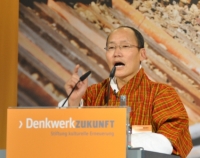Back to Speakers and Discussants
Dasho Karma Ura
Dasho Karma Ura
Dasho Karma is President of the Centre for Bhutan Studies (Thimphu, Bhutan), an non-affiliated, multi-disciplinary social science research centre focused on Gross National Happiness (GNH) and on the culture and history of Bhutan. He is a graduate of Magdalen College, Oxford and postgraduate of Edinburgh University. In 2006, he was awarded the ancient and well-known title of "Dasho" by His Majesty, the 4th Druk Gyalpo. His essays and articles have appeared in international journals, magazines and books. He is also a painter who has designed temple murals and thangkhas on a large scale.
Selected Publications
Die Entwicklungsstory von Bhutan nach Karma Ura. Deutschen Bhutan Himalaya Gesellschaft e.V., Köln (übersetzt von Dr. Manfred Kulessa) (2010)
A Proposal for GNH Value Education in Schools. Gross National Happiness Commission, Thimphu (2009)
Culture, Liberty and Happiness. Centre for Bhutan Studies, Thimphu (2007)
Gross National Happiness and Development. Centre for Bhutan Studies, Thimphu (Edited with Karma Galay) (2004)
Hero with a Thousand Eyes. Karma Ura, Thimphu (1995)
Selected Quotations
"Among the Bhutanese people there are growing expectations, rising steadily like Bhutan's forest cover, for more consumption and possession. Expectations may be ideally moulded to fit a lifestyle that reflects a balance between tradition and modernisation, between materialism and spiritualism, and between commodity wealth and quality of life. Bhutanese policy makers aim for such a balance, and pursue Gross National Happiness (GNH)."
In: The Bhutanese Development Story, 2005
"As I perceive, the three dominant global problems are: inequality of income, environmental deterioration, and conflicts not only between human beings but human beings and other life. Promotion of cultural liberty around the world is particularly meant to promote democracy and human rights, and through them peace and development. Conflict usually means violence. Absence of conflict (understood as violence) does not mean collective happiness, which is also a self-evident value and for which much more positive conditions are needed to be felt. The Bhutanese government's agenda has attempted to encompass the global problems mentioned above locally within Gross National Happiness. There is the beginning of a search for gross or collective national happiness, it being understood that happiness can become elusive while individuals become perfectly 'better off' through modernization. The challenge is how to transcend various problems of material poverty while simultaneously creating conditions for happiness."
In: Culture, Liberty and Happiness, 2007
"One may have everything - income, environment, culture, community, health and so forth. But none can be savoured without the capacity for a balance use of time in 24 hour cycle. Free time and unpaid work need to be valued. How well we live can be judged by how well we can distribute our time within every 24 hours cycle over sleep, work, socialisation, physical exercise, reflection, education, personal care and so forth. Loss of enough time for any of these essential activities is indeed diminution of the breath of life. Time use balance interpenetrates all crucial aspects of happy life. As a measure of wholeness of life, balanced time use represents both process and outcome of good life. Each person has to live well, 24 hours at a time."
In: Happiness beyond Wealth, 2009




